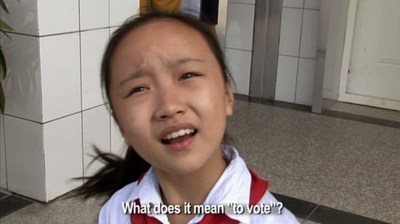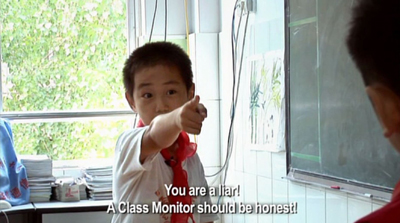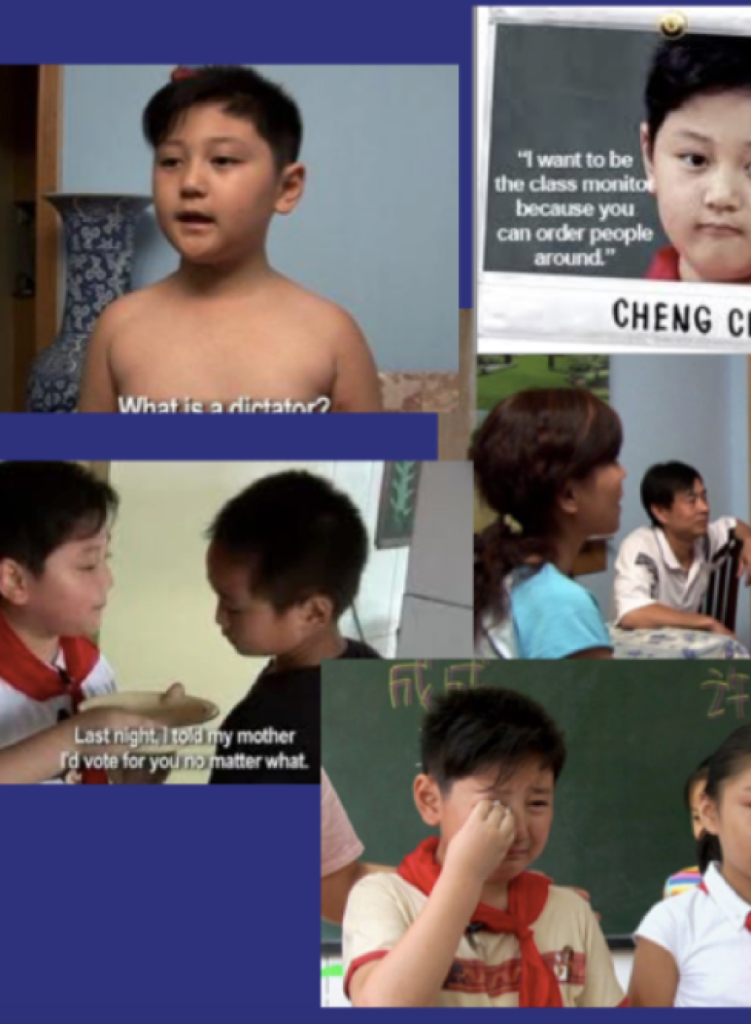One of the most powerful scenes in the documentary is when Cheng Cheng walks around the classroom after his performance in the talent show, shaking his supposed supporter’s hands and repeating “This is good karma!” Immediately after, he leads the students in expressive slogans and chants highlighting Luo Lei’s authoritarian regime and his tyrannical methods. Especially in contrast to one of the last scenes, when the votes are being tallied to an unequivocal Lei victory and a practically and emotionally defeated Cheng mutters “If Luo Lei wins, he’ll torment you to death,” these two scenes demonstrate the difficulties for an opposition movement coming into a democratic process. Initially, in the excitement of a viable possibility for change, Cheng Cheng is able to mobilize voters and fire up the ‘crowds’ to an extent that the incumbent is seconds away from stepping out of the election process. However, Lei has the resources (an overly enthusiastic father) to slowly, as the campaigning process drags on, win back favor through material gifts that overshadow the prior 2 years of tyranny. He is able to capitalize on some character flaws in the opposition, separating and taking the enthusiasm out of the opposition movement. At this point, voters will support who they know, who they both fear and love – Luo Lei. Can this be considered democracy? Probably not. It is yet another example of democratic hope undermined by the erosion of necessary democratic processes and an equal playing field that is so often seen in the transition on the spectrum from authoritarianism to democracy.
Machiavelli and Film
The film presents us an alarming view of “democracy”. Perhaps Machiavelli would be a fan of Luo Lei, in that he is able to reach a middle ground between being feared and being loved. Though it is clear that he has beat up his classmates, it seems that he is able to appease them through the gifts his father suggests, such as those from the autumn festival or the trip to the monorail. Despite my readiness to dislike the incumbent, I can see how he holds a certain degree of virtue, at least in the way Machiavelli describes it. In the beginning of the film, he says that he wants people to vote for who they want. This film shows democracy in a loose sense. The classroom community is too small to mirror the way the masses consider political candidates. However, one thing is abundantly clear through Cheng Cheng and Luo Lei’s actions: the playing field is not fair. Xiaofei’s efforts are undercut from the beginning of the talent show, when her classmates scream insults at her. The unfairness of the election process is relevant in examining many democracies around the world. It seems that the main challenge to democracy presented in the film is that the children don’t really know what a democracy is, as we are shown at the outset of the film. Once they are given the power to choose for themselves, it makes sense that they would revert back to the incumbent, back to what has always been. For these reasons, they accept him despite his authoritarian form of ruling the classroom.
What Would Machiavelli (or Tocqueville) Say?
The 2007 documentary Please Vote for Me presents a study of contrasts, a classroom experience unlike what many of us experienced growing up in the United States, yet also painfully familiar to anyone who’s been a kid in school (for example, the scene where all of the kids are crying like babies…ok, maybe that’s just me…).

The film offers up representations of discipline and authoritarian order, including shots of students in neat rows doing calisthenics and singing patriotic songs, scenes that conjure up remembrances of the old, Maoist China. Yet inside the classroom, the students embark on a new experiment in democracy, one that they and their parents take to unequivocally, enthusiastically.

Luo Lei, class monitor with two years of experience already under his belt, represents the incumbency. His ultimate victory over his challengers—the Machiavellian (and Cart- man-esque) Cheng Cheng and Xiaofei—presents us with a contradiction. Over and over again we see the children groaning and bellyaching about Luo Lei’s strict and authori- tarian behavior as class monitor, and yet, Lei nonetheless prevails over his challengers —doing so in decisive fashion.
Consider the film in light of our discussions and readings. Is this democracy in action?
Notes on a Revolution
Notes on a Revolution
Cuba: A Photo Essay
What I remembered was what was missing. It took me two days to remember what had happened here, that there was a revolution here, that 70 years of embargo and shared hostility had passed between the Cuba and the United States. There was in Havana very little of the sort of official instruction and loud denunciation you might see in Tehran or even Cairo on a bad day. To find the revolution I had to go out and find it. It wasn’t easy.

Not that the state had forgotten. Efforts had to be made to reproduce the revolution and the usual posters and proclamations could be found here and there, desultory affairs placed on the entrances to government buildings and behind teller windows, dutifully ignored by the public. Politics, it seems, does not get in the way of being Cuban and folks went about their daily lives unmolested by the official discourse. Havel’s green grocer needn’t bother in Cuba, the panorama overwhelmed the message.
But what did it mean to be Cuban? Sit in a shaded corner of the old town and watch Cubans put on the act for her visitors, Buena Vista soaked daydreams for the traveling crowds. A simulacra of the “real” Cuba on repeat, until eventually the performance becomes the thing itself.
For their part, the tourists played their part. They come to Cuba dressed to the gringo nines, with satchel and camera bandolier-strapped across their bodies, and go about their business in almost scientific fashion, self-made anthropologists in the wild. We curate our lives nowadays, our experiences mediated by the lens of a camera or a cell phone, and here it was no different, the photos taken of the “reality” and “actual Cuba” destined for a Facebook and Instagram feed but only if they matched what we already imagined Cuba to be.
Was I complicit in producing this illusion? I kept my distance from the foolishness, taking care to pull my iPhone from my cargo shorts in increments…
Cubans sat through these hijinks with aplomb, by turns amused and indifferent. Some were on the make, and found ways to pull resting tourists from park benches and into the restaurants and cabarets, but for the most part the hustle was constrained.
More than anything, their expression was one of compassion and a genuine interest. Where was I from? Mexico? Italy? What did I think of Cuba?
I stayed further out from the center and so had to learn quickly how to get around in order to go about my business. Anyone’s who’s ever lived or worked in a developing country will immediately recognize Havana’s routines, the aggravation and frustration of trying to acquire transport, the ceaseless negotiations and information sharing among ordinary folks, the easy conversations that comes when a crowd of hot and bothered folks find themselves tossed into the same mess. Cubans gave me the same camaraderie that I’ve encountered in Tehran, or Recife, or Montevideo, everyday folks eager to help a wayward tourist but also each other, even as they bustle and hustle to grab that last spot on the bus.
But the colors! The days were colors, more than I could have imagined, more than I could bear.





Subscribe to The Morning Email.
Wake up to the day’s most important news.























Democracy’s Prospect
Many people in the US feel as though whoever they vote for won’t change anything in our society. This is one of the reasons that voter turnout has dropped so far in recent decades. Many people believe this signifies the beginning of the end of our democracy. This belief in an inability for change is a sign that people have less faith in the potential of democracy. The main function of democracy is after all the fact that the public votes for who has the power, and when that fails then it is understandable that the people begin to lose faith in the system. Additionally, voters have become more and more polarized, voting for either the republican or democratic party are on completely opposite political spectrums of one another. We talked about in class about how the most liberal republican is still very much more conservative than the most conservative democrat, illustrating just how different the two parties are. Clearly these points can be interpreted as signifiers for the crash of democracy, however I don’t think they are. Although I agree that politics in America have certainly taken a few steps back in recent decades, I believe that they will always come back. Most, if not all, people in America can’t imagine a non-democratic society and wouldn’t even entertain thoughts of a different form of government. While our politics might be in a rough patch, I am strong believer in that they will bounce back.
Democracy’s Prospects
After considering the readings and my own gut feelings, I feel that although in America Democracy will not implode any time soon, I feel that there are many aspects that may be eroding. That being said, I do agree that outside of the United States and other stable western countries, democracy is not as solid as it may seem. In the United States, especially after the election of Donald Trump, the illiberal trends mentioned in the readings are apparent. The polarization of the country is disconcerting considering the liberal doctrines this country stands on. I think that in less stable countries where democracy does not have as solid of a base, a similar polarization would cause the government to collapse. I also tend to agree with the point mentioned in the readings that democratic positions are filled with the wealthy and that in order to run for office one needs the necessary funds. This point is quite interesting because no matter how obvious this seems, there is no real way to combat the wealth gap in politics. Bernie Sanders attempted to bridge this gap I think, but in the end failed. It is possible that the economic elites will always rule in the current democratic system. That being said is it truly a democratic system if only the elites can actually hold power?
Democracy’s Prospects
American democracy is imperiled because of party polarization. No longer are people voting for a “popular passion” because the two political parties have become so polarized—the system is red or blue. Zakaria elaborates on the historical significance of political parties being able to channel interests into policy. Currently, the middle is so eroded that a stalemate has taken form. The democratic process loses efficacy in this state of polarization. Another peril is the rigidity of one’s association with a political party. Zakaria notes Tocqueville’s observation of America being held together by civic bonds or “intermediary associations”—concepts that are lost in today’s hyper-individualized atmosphere. Tocqueville notes the significance of groups and clubs in America that are catalysts of political change, formation, and even reflection. Zakaria contrasts this beneficial system with that of today, calling us all “entrepreneurs.” The middleman is out, and we pull all our identity from our respective political party, a party which is now unreachable and unchangeable to the average citizen. As we have alluded to in class, we do our work in the coffee shop to be alone together. We are seeing less association at the grassroots level to any popular passion. The system is ineffective to the ordinary citizen. As Foa and Mounk’s article points out, there is in fact a disillusionment with democracy. It is becoming less popular, less trusted. The system isn’t working for the ordinary citizen; it’s only working at the top level for the rich and powerful. The article cites a study that found that the most influential people in determining policy of the past 30 years have been economic elites and narrow interest groups. These promoters of illiberal democracy destroy the means to getting to liberal democracy. The middle is falling out both literally and symbolically. How can the ordinary citizen affect change? I think it is both a structural and cultural problem. Democracy’s survival must stem from an ideological change in the people; the system needs to find power from the bottom up rather than trust the power from the top down.
Informal Mechanisms
While reading Zakaria’s views on the importance of civic associations in liberal democracies, I sought to understand the roots of the cultural erosion which has propagated illiberalism. Zakaria claims that these social buffers which regulate society have eroded due to the weakness of political parties. As argued, a transparent, individualistic Congress gives these intermediary associations no use, allowing politicians to run free in an entrepreneurial system. Tocqueville’s “informal mechanisms” which lead to a civil society that fosters and supports the institutions of democracy have now failed to set a professional, political standard, leading to a loss of the culture of democracy within our country.
With these modes of buffering now deteriorated, Americans have promoted populist regimes, dangerously pairing both popular passions and public policy. As Zakaria argues, even though it is integral that a democratic society adheres to popular sentiments, without the consideration of liberal values our country is tending towards a tragic devolve. These civic associations are the liberal filters which allow the U.S to foster and promote the same institutions of Democracy which aided in the founding of America. Without them, U.S politics is like a child without their parents, left without a figure to mediate its actions in order to protect the long term interests of the country.
Democracy
Roberto Foa and Yascha Mounk discusses a wide variety of things that pertain to the survival of democracy. One of their worries, which Tocqueville as “intermediary associations”, are the informal mechanisms that sustain a liberal democracy. These mechanisms/associations are defined as “the groups in between the government and the family that exist as arbiters and regulators of society” (Foa and Mounk 7). Foa and Mounk then identify factors that are degrading the strength of these mechanisms/associations and conclude that politicians are acting too much like businessmen and the system is too open now leading people to be able to do whatever they want. To prevent this peril from reducing the chance this democracy has for survival, there needs to be a series of balances that Foa and Mounk later introduce. The first is the balance between aristocratic and democratic ruling, the second is between popular passions and public policy, and the final is between checks and balances. All of these opposing forces need to strike a cooperative balance to prevent one party from gaining too much power and acting selfishly to reduce the justices and freedoms of its citizens.
The Culture of Democracy
Ultimately, my “gut feeling” is that the imperilment of democracy in the US stems from the loss of the culture of democracy within our country. It is the Tocquevillian “‘informal mechanisms’” that lead to a civil society that fosters and supports the institutions of democracy. The founding of the US is a perfect example of this itinerary from the ideas and culture of democracy to an institution of democracy. Although, as Zakaria mentions in the Sean Illing article, the founding fathers were wary of “democratic majoritarianism,” the introduction of liberal democracy was a completely unique experiment, based on the informal stipulations of the colonies. The presence (and lack of) cultural norms supported by the regime of the British monarchy, ultimately lead to the the emphasis of the key aspects of the Constitution—freedom of expression without fear of punishment, elected officials, control over policy invested in those elected officials, etc. Today, those same cultural stipulations are not as celebrated. In class, we mentioned the discrepancy between the voter turnout in the Iranian 2009 presidential elections (around 85%) and that in the US 2008 elections (around 50%). The conclusion we can draw from such a comparison, is that the US culture has become complacent and content. Citizens in the US don’t feel the need to vote, because there is no need to change things. Comparatively, in Iran, the elections are the only chance, albeit very little, to change things. In this way, I find it laughable and ironic that the very cause of the “imperilment of democracy” that has the media up in arms is what makes our country unique and successful.

